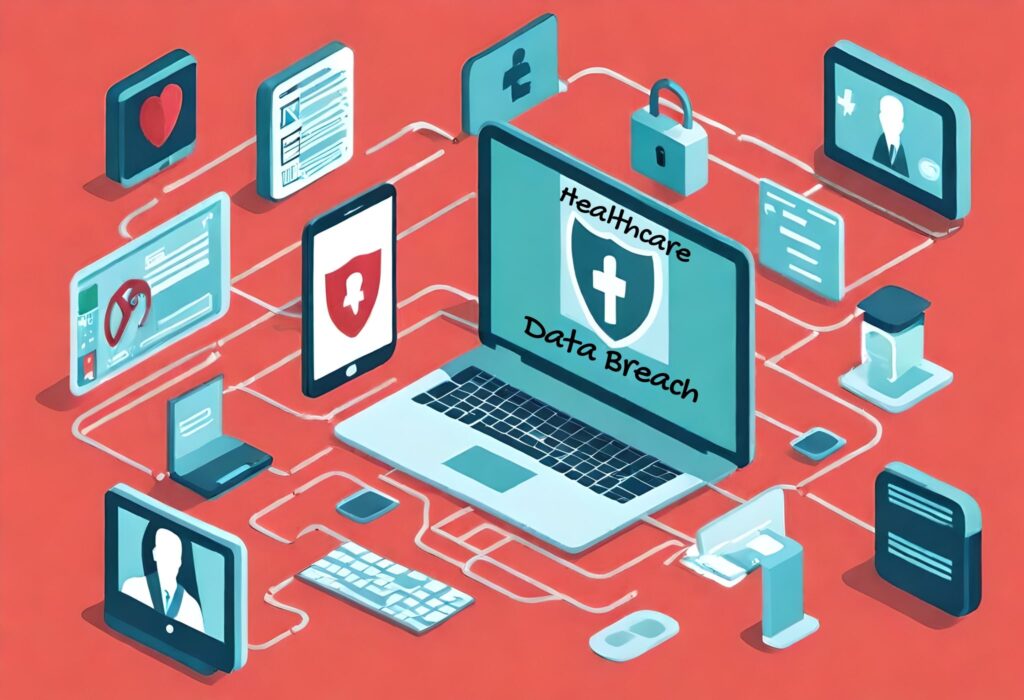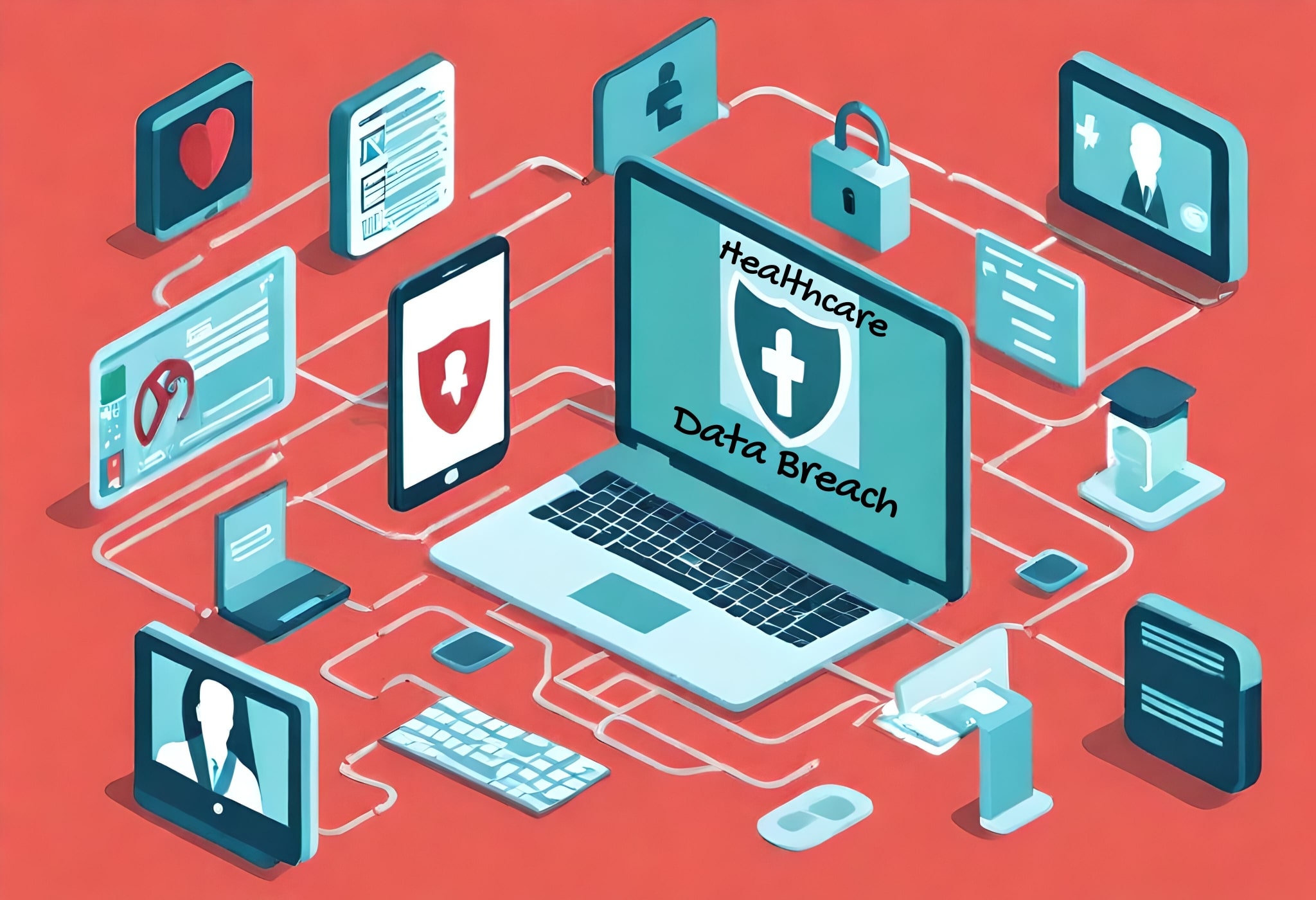The healthcare industry possesses some of the most sensitive data imaginable: a patient’s entire medical history. Unfortunately, this valuable information also makes it a prime target for cybercriminals. Healthcare data breaches are on the rise, posing a significant threat to patient privacy, trust in healthcare providers, and the financial well-being of institutions.

In this post, we explore the increasing threat of healthcare data breaches and the impact they have on patient privacy. We also provide tips on how healthcare organizations can protect sensitive patient information from cyber threats.
Understanding Healthcare Data Breaches
In today’s digital age, our health information is increasingly stored electronically. This convenience comes with a critical concern: healthcare data breaches. A healthcare data breach occurs when unauthorized individuals gain access to protected health information (PHI).
PHI is any data that links you to your medical condition, treatment, or payment history. This includes details like:
- Name
- Address
- Date of Birth
- Social Security number
- Medical diagnoses
- Medications
- Treatment records
- Insurance information
Breaches can happen intentionally, through hacking attempts or malware attacks. They can also be unintentional, like a lost laptop containing unencrypted patient data. Regardless of the cause, a data breach can have serious consequences for patients.
By understanding healthcare data breaches, you can be more vigilant about protecting your information. Knowing the types of breaches, how they occur, and the potential consequences empowers you to take action.
In the following sections of this blog, we’ll delve deeper into the impact of data breaches, the various ways they happen, and the steps you can take to safeguard your health information.
Impact on Patient Privacy
Healthcare data breaches pose a significant threat to patient privacy. When sensitive patient information is compromised, it can lead to identity theft, financial fraud, and other serious consequences for individuals. Patients trust healthcare organizations to keep their personal and medical information secure, and breaches can erode that trust.
In addition, healthcare data breaches can also lead to legal and regulatory repercussions for organizations, as they are responsible for safeguarding patient data. Healthcare organizations must prioritize data security and implement robust measures to protect patient privacy.
This can include encryption, secure data storage, regular security audits, and staff training on best practices for handling sensitive information. By taking proactive steps to prevent data breaches, healthcare organizations can uphold patient privacy and maintain trust in their services.
Common Causes of Healthcare Data Breaches

Several factors contribute to the rise of healthcare data breaches. Most of the common causes are:
- Human error: Employees may inadvertently expose sensitive patient information by mishandling data or falling victim to phishing scams.
- Insider threats: Employees with access to patient data may intentionally misuse or steal this information for personal gain.
- Cyberattacks: Hackers may target healthcare organizations to gain access to patient data, sell it on the dark web, or use it for fraudulent activities.
- Lost or stolen devices: Laptops, smartphones, or other devices containing patient information can be lost or stolen, putting sensitive data at risk.
- Third-party breaches: Healthcare organizations may work with third-party vendors or partners who have access to patient data, and if these partners experience a breach, it can impact the healthcare organization as well.
To mitigate these risks, healthcare organizations should invest in robust cybersecurity measures, conduct regular security assessments, and train staff on how to recognize and respond to potential security threats. Additionally, implementing strong access controls and encryption can help protect patient data from unauthorized access.
Tips for Protecting Sensitive Patient Information
Fortunately, there are several actionable steps healthcare organizations can take to improve their data security posture. Here are some best practices:
- Employee Training: Regularly educate staff on cybersecurity best practices, including phishing awareness and password hygiene.
- Data Encryption: Implement strong encryption for all patient data, both at rest and in transit.
- Access Controls: Establish strict access controls that limit access to patient data based on the principle of least privilege.
- Regular Security Audits: Conduct regular security audits to identify and address vulnerabilities in systems and processes.
- Multifactor Authentication: Implement multifactor authentication for all user accounts to add an extra layer of security.
- Risk Assessments: Conduct regular risk assessments to identify and prioritize potential threats the organization faces.
- Data Loss Prevention (DLP): Utilize DLP software to prevent accidental or unauthorized data exfiltration.
Importance of Compliance with HIPAA and other regulations
Healthcare organizations must prioritize compliance with HIPAA (Health Insurance Portability and Accountability Act) and other regulations to protect patient privacy and prevent data breaches. This includes implementing strong security measures, conducting regular risk assessments, and providing ongoing training to staff members on handling sensitive patient information.
Non-compliance can lead to severe penalties and reputational damage for healthcare organizations, so it’s crucial to stay up-to-date with the latest regulations and ensure that data protection protocols are consistently followed. By prioritizing compliance, healthcare organizations can safeguard patient data and maintain trust in the healthcare system.
Read: AI in Healthcare: New Possibilities in Healthcare
The Role of Cybersecurity in Healthcare Organizations
As technology continues to advance, healthcare organizations are increasingly at risk of data breaches that compromise the sensitive information of their patients. These breaches can significantly impact patient privacy and trust in the healthcare system.
Healthcare organizations must prioritize cybersecurity measures to protect patient data and maintain the confidentiality of medical records. Implementing robust security protocols, regularly updating software, and providing ongoing cybersecurity training to staff are crucial steps in safeguarding sensitive patient information.
Additionally, utilizing encryption and access controls can help prevent unauthorized access to healthcare data. By prioritizing cybersecurity, healthcare organizations can better protect patient privacy and maintain the trust of those they serve.
Steps to Take in the Event of a Data Breach
In a data breach, healthcare organizations must act quickly to mitigate the impact on patient privacy. First and foremost, it is crucial to notify affected individuals and regulatory authorities as required by laws and regulations. Prompt communication can minimize the potential damage and demonstrate transparency in the face of a security incident.
Additionally, conducting a thorough investigation to identify the cause of the breach and implementing measures to prevent future incidents is essential. Healthcare organizations should also consider offering credit monitoring and identity theft protection services to affected individuals to help mitigate the potential harm caused by the breach.
By taking proactive steps in the event of a data breach, healthcare organizations can demonstrate their commitment to protecting patient privacy and maintaining trust in the healthcare system.
Read: Disruptive Innovation in Healthcare: Discover 5 Innovations!
Conclusion
Healthcare data breaches are a serious threat to patient privacy and can have damaging effects on individuals and healthcare organizations. Healthcare organizations must take proactive measures to protect sensitive patient information and prevent data breaches.
This includes implementing robust cybersecurity measures, conducting regular security audits, and providing comprehensive training for staff on data security protocols. Additionally, healthcare organizations should stay updated on the latest security trends and technologies to ensure they are staying ahead of potential threats.
By prioritizing data security and privacy, healthcare organizations can work towards creating a safe and secure environment for their patients and employees.
What information is at risk in a healthcare data breach?
How can a healthcare data breach happen?
Malware Attacks: Malicious software can infect computer systems and steal data.
Insider Threats: Employees or contractors with access to patient data may intentionally or unintentionally compromise it.
Physical Loss of Devices: Laptops, USB drives, or other devices containing unencrypted patient data may be lost or stolen.
What are the consequences of a healthcare data breach for patients?
Financial losses: Patients may be liable for fraudulent charges resulting from identity theft.
Difficulty obtaining insurance: A history of a data breach could make it harder to get future insurance coverage.
Emotional distress: The fear and uncertainty associated with a data breach can cause significant stress and anxiety.
What can I do if I believe my data has been breached?
Review your credit report: Monitor for any suspicious activity and consider placing a freeze on your credit report.
Report the breach: If you suspect a data breach, report it to the Department of Health and Human Services (HHS) Office for Civil Rights (OCR).
Consider enrolling in identity theft protection services.
How can I protect myself from healthcare data breaches?
Be cautious about what information you share online and with healthcare providers.
Use strong passwords and enable two-factor authentication whenever possible.
Review your medical bills and statements regularly for any suspicious activity.

Leave a Reply
You must be logged in to post a comment.